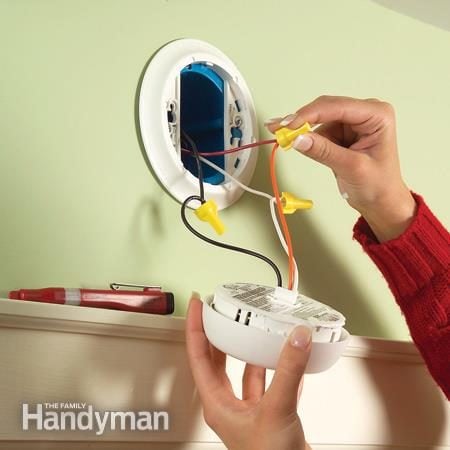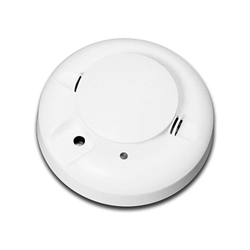
How to reset wired smoke detectors? What is better, hard wired or battery smoke detectors? Should you choose wireless or wired smoke alarms? Which smoke detector is best? Get free 2-day shipping on qualified Hardwired Smoke Detectors products or buy Electrical department products today with Buy Online Pick Up in Store.

The unit features an ionization sensor to detect fires , as well as an electrochemical carbon monoxide sensing system. Hardwired smoke detectors are wired so that if one detector warns of smoke or fire, the others also go off. This way, all areas of the home are warned.
The other nice feature is battery backup. The detector runs on 125-volt power until the power goes out. Then the battery kicks in and keeps right on protecting you. Remove the face of the alarm. Use a vacuum or a small brush to clean out the smoke detector.
If there’s a lot of dust build up, try using a mild detergent to help remove it. Replace the face of the detector and listen for the chirping sound. Photoelectric technology is generally better for large particles, like the kind you get in a smoldering fire. They chirp, or go-off for no apparent reason. Even hard-wired alarms can run into battery power problems, because they have backup batteries in them.
This connection makes it simple to replace bad or old smoke detectors with new ones. The key is knowing what connector your smoke detector has so that you buy a new smoke detector with the same connector. First Alert AC Hardwired 120-Volt Smoke Detector Hardwired ionization smoke alarm with Volt battery back up and adapter plugs.
Battery backup provides consistent protection for added safety during power outages. Smart technology helps to reduce the number of nuisance alarms. Most hard-wired smoke detectors include a 9-volt backup battery that’s supposed to kick in if your home loses electricity. If that battery is running low, your detector alerts you with a high-pitched beep. A hard-wired smoke or carbon monoxide (CO) alarm is wired to a 120V household electrical circuit and is connected to other detectors throughout your home.
Hard-wired smoke and carbon monoxide alarms sound simultaneously, on all levels of your home, when a single unit detects smoke or gas. Large selection at wholesale pricing and ready to ship. Shop online and saving! Wholesale volume pricing and fast shipping. Energy-Saving Solutions.
Fill Your Cart With Color today! Costs to replace hardwired smoke alarms. You can replace hard - wired detectors yourself, if you can reach them and if you have sufficient skill to replace a light fixture.
Be sure to first turn off electricity at the breaker box. Otherwise, you can hire an electrician or an alarm service company to do the job. How To Replace A Hard Wired Smoke Detector Shut off the power to that circuit at the main electrical panel. Unscrew the old detector from it ceiling or wall mount. Take note of the three wires are you detach them from the old smoke detector.
Black=120V Power, White=Neutral, and Red or Yellow are. But there are smoke detectors out there that cost a lot less and still work just fine. This hardwired ionization smoke alarm has all of the standard features: a silence button, a low battery alert light, and an easy-to-access backup battery. It’s smart to change the battery of a battery-source smoke alarm on a scheduled replacement basis.
However, waiting until the annoying beep signals a weak battery is the more typical way we keep our home smoke detectors working. If you fall into this category, a hardwired smoke detector may be your best choice. Turn off the electric to the circuit that you are working on. Take down the old electrical smoke detector and check to see.
Most 110-volt hardwired smoke detectors have a light that stays lit constantly. Have a helpful assistant turn off breakers, one by one, and watch for the light to go out. In most cases chirping hard-wired smoke alarms can be stopped by pressing and holding the reset button.
Wait a few minutes to see if the chirping stops. If it does not, try cleaning any dust out of the alarm with a compressed air can. Sometimes the chirping can be caused by a dead backup battery.
No comments:
Post a Comment
Note: Only a member of this blog may post a comment.